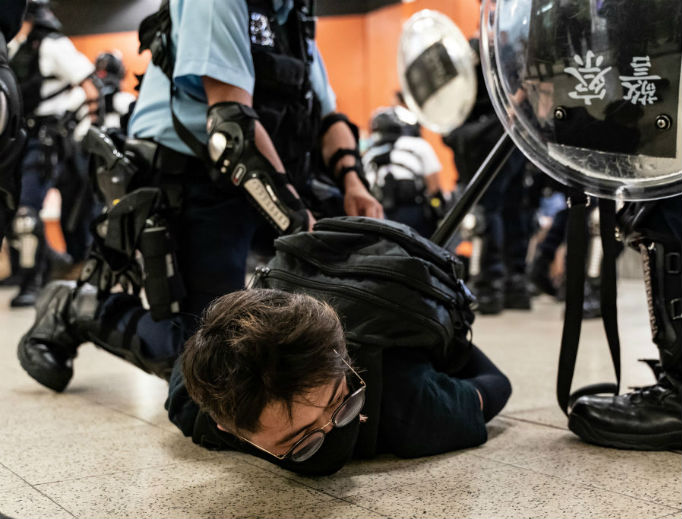Hong Kong Student Leader Says Extradition Bill’s Withdrawal Not Enough to Stop Protests
Hong Kong Chief Executive Carrie Lam announced Wednesday via a video message that she is officially withdrawing a bill that, if passed into law, would have allowed extraditions of alleged criminals to mainland China.

HONG KONG — Despite Hong Kong’s chief executive announcing that she will withdraw a controversial extradition bill, protests are continuing, with demonstrators demanding additional government and police reforms, said the leader of local Catholic student group.
“I don’t think that they will [be] satisfied with the withdrawal of the bill ... people are too angry at the government and the police,” said Edwin Chow, acting president of the Hong Kong Federation of Catholic Students.
Chow told CNA that demonstrators are angry not only about the bill, but also about police brutality shown in recent months and what they describe as unjust limits on democracy.
“So they will keep protesting, of course. And what has happened the last weekend is that on the 31st of August, actually we had a large protest, which originally the government did not allow, but we still [went] on the street, protesting. And the police used tear gas, and they used water cannons on the people,” he said.
Hong Kong Chief Executive Carrie Lam announced Wednesday via a video message that she is officially withdrawing a bill that, if passed into law, would have allowed extraditions of alleged criminals to mainland China.
The controversial bill sparked widespread protests on the island territory, beginning in earnest with a demonstration June 6 that saw an estimated 1 million Hong Kongers take to the streets. Additional large-scale protests have taken place since, with police occasionally resorting to forceful tactics such as tear gas and water cannons.
Lam had suspended, but not fully withdrawn, the bill on June 15 after first introducing it in February. The process of withdrawal will officially start in October when the territory’s legislature next meets.
Hong Kong — a “special administrative region” of China, meaning it has its own government but remains under Chinese control — has total freedom of worship and evangelization, while in mainland China, by contrast, there is a long history of persecution for Christians who run afoul of the government.
Many Christians feared that the bill would provide a means for the mainland Chinese government to tighten its grip on the free exercise of religion in Hong Kong, as well as a means to persecute those in Hong Kong who support persecuted Christians on the mainland.
The island is only about 8% Catholic, but that represents a population of over half a million.
Protesters have articulated five demands for the government of Hong Kong, one of which was the withdrawal of the bill.
The other demands include Lam’s resignation; an independent inquiry into police brutality; the release of arrested protesters, who number nearly 1,200 in total; and an expansion of democratic freedoms, including universal suffrage. Under the current system, the territory’s chief executive is not elected directly by the people of Hong Kong, but rather a 1,200-member election committee.
“I think if we have true universal suffrage, maybe the chief executive ... will really listen to people, because she’s elected by the people,” Chow said.
“The people [should] have the power to impeach him or her. The chief executive should be responsible to the people. But now...because now the government is selected by Beijing, they only can be loyal to Beijing, but not Hong Kong people. So this is why I think the people will keep protesting.”
Chow said beginning on Sept. 2, many university students boycotted their classes. He said the plan originally was to boycott for nearly two weeks, until Sept. 13. The boycott was “not well-planned,” he acknowledged, and right now it is “not very obvious that we are having a strike,” but student groups are planning to hold assemblies and meetings during the class boycott.
Chow said there is another large protest planned for this coming weekend, this time at the airport, where a large group of protesters gathered last weekend. He said many people have been arrested at subway stations.
He said he does not know of any members of the Catholic student groups that have been arrested or injured in the protests.
The auxiliary bishop of Hong Kong, who has been a vocal supporter of the protests, told CNA last week that he hopes prayer will help transform the area into “a channel of God’s peace.”
Many Catholic clergy in Hong Kong, including apostolic administrator Cardinal John Tong and bishop emeritus Cardinal Joseph Zen Ze-kiun, have expressed support for the protesters.
“We’re urging fellow parishioners to join our ‘Friday fasting’ movement,” Bishop Joseph Ha Chi-shing told CNA on Aug. 30.
“It’s been a tradition for us to fast on Fridays. However, this tradition somehow was abolished. With fasting and prayers, we hope that we can help ourselves to strengthen our mind and soul to fight evil thoughts. Then, we would be in a better position to help fellow Hongkongers.”
Bishop Ha, who has taken part in ecumenical prayer rallies with protesters in the past, urged an increase in prayer and said he is concerned for the safety of the many young people involved in the protests.
“I do worry about the safety of the protesters, especially the young ones,” he said. “Youth is not just our future, they are also our present as Pope Francis said. Feeling sad, helpless and sometimes even furious is not unusual. However, we must prevent sadness developing into hopelessness, prevent anger turning into hatred.”

















